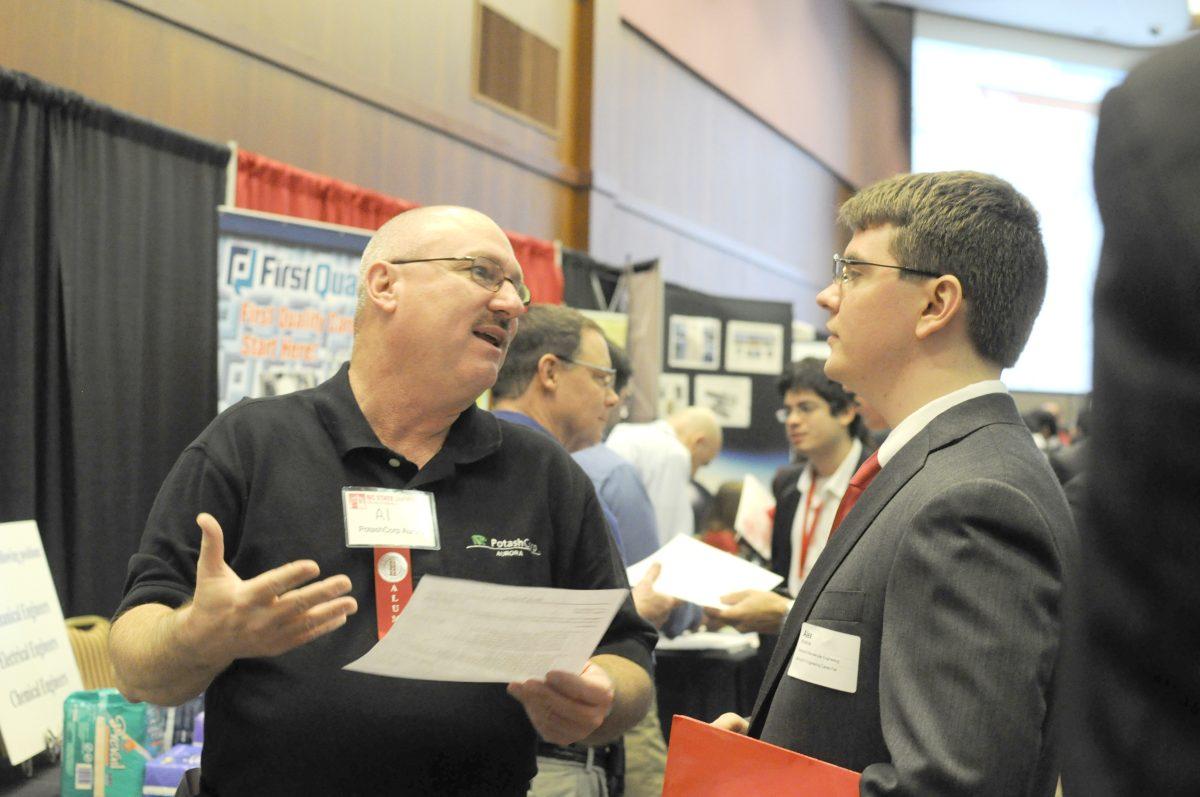
Chris Rupert
Alex Woodrow, a senior in chemical engineering speaks to Al, a representative from PotashCorp Aurora Wednesday Feb. 6, 2013 at the Engineering Career Fair at the McKimmon Center. The fair attracted an estimated 2000-3000 students and over 200 recruiters. Photo by Chris Rupert
The Spring Engineering Career Fair took place this past Wednesday, and students looking for both jobs and internships could be seen trying to impress potential employers with resumes.
Held at the McKimmon Center, the fair comprised of thousands of students and over 200 employers. Held biannually, the fair is one of the largest engineering expos in the nation, according to a University press release.
The fair seemed like a packed concert, with students lining up for a chance to speak with their favorite rock star employers. However, the roles were reversed at times. Representatives were equally interested in the students and actively recruited their prospects for an engineering record deal.
Kyle McKenzie, a junior in electrical engineering, was among those looking to connect with a big company. The event was his first and he named Cisco and IBM as his top places to potentially intern with. “It was a super good opportunity to network,” McKenzie said. “I was able to talk to three companies I really have a desire to work for and while waiting in line, I was approached by two people that wanted me to work for them.”
Despite McKenzie’s experience, dozens of students waiting to show their resume to two or three representatives poses some interesting questions:
Do students benefit from the exposure of career fairs, or is it a hopeless wish in the current job market?
A report by Eve Tahmincioglu of NBC News described career fairs as “a lesson in futility.” Too many people, not enough employers and not enough jobs were the sum of her findings.
Jennifer Olson, a representative for EchoStar, a telecommunications company, supported Tahmincioglu’s evidence. “[Engineering career fairs at N.C. State] are usually pretty busy with a steady flow of students,” Olson said. “It really depends on the year, but [we hire] anywhere from one or two to 10 students per season.”
EchoStar has almost 2,500 employees and hires only a handful of students from the thousands attending engineering fairs across the country. This could be the sign of a struggling economy or the illusion that career fairs are effective.
Colt Jackson, who graduated with a degree in civil engineering in Dec. 2012, had mixed feelings about the career fairs he attended. Most of his graduating class received engineering job opportunities and many were able to obtain interviews with companies at career fairs, according to Jackson. However, he ended up with the N.C. Department of Transportation through the Career Center despite attending multiple fairs.
Jackson claims many employers did not take students’ resumes and had them submit them online instead. “A lot of people would just say they didn’t think (the employers) kept their resume because it was submitted online,” Jackson said. “For me it was a good thing because I don’t think I could have talked to all the companies that were there, so I just did it online.”
An engineering student’s success at a career fair is also relative to their major, according to Jackson. “I think certain majors might have an easier time. It seemed like a lot of the companies there were specifically looking for people in computer science. They really desired those positions.”
Jackson also mentioned chemical and electrical engineers having a better opportunity to find a job or internship.
Sara Concini, assistant director at the Career Development Center, advocated the nature of career fairs. She described them as quality events offering students many ways to connect to employers while exploring and developing their careers. “One reason [for career fairs[ is to build relationships with employers,” Concini said. “Another one is to engage in good conversation about the possibilities for co-ops, internships and full time jobs. The third is to, hopefully, end up with an interview or a further connection for the relationship with that employer.”
McKenzie echoed Concini’s claims and said career fairs seem to be effective ways to start a career. “[The event] opened doors to two or three good prospects for summer internship or co-ops,” McKenzie said. “I would definitely recommend it to others.”